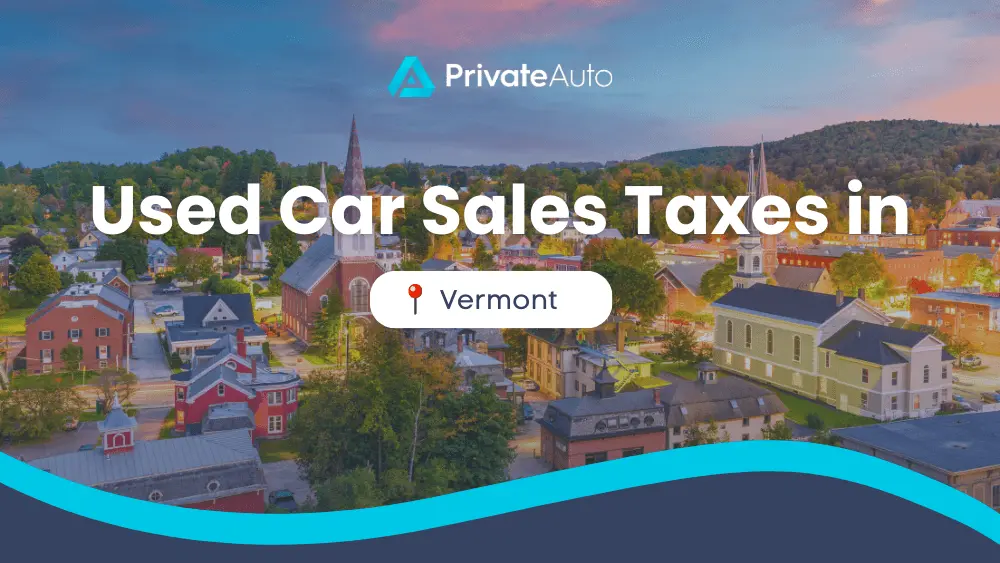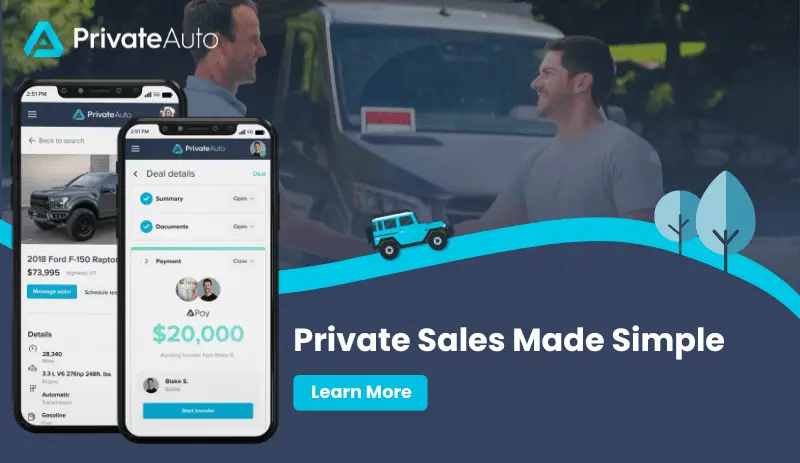Vermont vehicle sales tax is 6% of the vehicle’s purchase price. On top of that, you may owe local taxes as well. And then there are the fees.
Keep reading to get the scoop on Vermont’s vehicle sales taxes and fees.
How much tax do I pay?
Do you Pay Taxes When you Purchase a Car From a Private Party in Vermont?
Vermont Discretionary Sales Surtax
Six out of fourteen Vermont counties charge their own 1% sales tax, called a “discretionary sales surtax,” which is added to the state’s 6%. Residents of the following counties owe the surtax, meaning they’ll actually be paying 7% sales tax.
- Addison County
- Bennington County
- Chittenden County
- Franklin County
- Rutland County
- Windham County
You pay the surtax (if applicable) to the county in which you are registering the vehicle.
Let’s use an example to make this more understandable.
Say you’re in Addison County, Vermont, and you find a 2014 Toyota Tacoma for $25,000.
You’ll owe $1,500 in state sales tax ($25,000 multiplied by .06) plus an additional $250 in county surtax ($25,000 multiplied by .01), for a grand total of $1,750.
If all of this is melting your brain, feel free to take advantage of our free sales tax calculator.
What is the Difference Between Sales and Use Tax?
Sales tax is a percentage of a car’s purchase price owed to the state of Vermont when you buy a car and register it in Vermont.
Use taxes are pretty much the same thing, but for out-of-state vehicles. When you buy a vehicle out-of-state and register it in Vermont, the state levies a 6% use tax (the use tax rate is the same rate as the sales tax rate). The use tax ensures that cars purchased within the state and cars brought into the state are taxed identically.
If you paid sales tax on the purchase of a vehicle in another state, Vermont deducts that tax so that you are not taxed twice. There are four potential scenarios.
1. You paid no sales tax in another state, in which case you owe the full 6% Vermont sales tax. Let’s say you bought a used car in Montana and didn’t pay any sales tax, given Montana’s 0% tax rate. You’ll pay Vermont’s full 7% sales tax.
2. You paid exactly 6% sales tax in Florida (the only other state with the same tax rate as Vermont), in which case Vermont will give you a pass.
3. You paid less than 6% sales tax in another state, in which case Vermont charges you the difference. Let’s say you buy a used car in New York for $20,000. New York’s tax rate is 4%, so you paid $800 (.04 X $20,000) in New York tax. When you go to register your car in Vermont, your total tax bill will be $1,200 minus the $800 you already paid in New York, for a total tax due of $400 to Vermont.
4. You paid more than 6% in the other state (for example, California levies a 7.25% tax on vehicle purchases). We wish we could tell you Vermont will give you a refund, but no. At least they won’t charge you any more tax.
To report sales and use tax, fill out the Vermont registration, tax, and title application.
Registration, Title and License Plate Fees in Vermont
In addition to the state car sales tax rate, you may owe other fees when buying a car and registering it in Vermont, such as a car title fee and a vehicle registration fee.
To register your vehicle at the Department of Motor Vehicles (DMV) branch office, you must show proof of car insurance. The first time you register a passenger vehicle, it will cost you $76 plus the $35 title transfer fee.
Vermont’s standard license plates cost $18. Personalized plates cost an additional $48.
How does Vermont calculate taxes?
How is Used Car Sales Tax Calculated in Vermont?
If the Department of Taxes suspects that the purchase price of the vehicle was artificially decreased, they will calculate sales tax based on the car’s fair market value or book value.
The Department of Taxes establishes what the car is worth on the open market by referring to its Kelley Blue Book, NADA value, or other reliable sources on used car prices. If they conclude that the car’s fair market value is greater than its purchase price, they can opt to base sales tax on the fair market value.
It is important to note that underreporting the purchase price of a vehicle in order to avoid paying sales tax is illegal.
How do I pay the Vermont car sales tax?
How to Avoid Paying Sales Tax on Cars in Vermont?
Do Vermont counties charge a surtax?
Vermont Car Sales Tax Exemptions
- Vehicles owned or leased by the government
- Vehicles owned by persons with disabilities
- Vehicles previously registered out-of-state
- Vehicles owned by veterans
Purposefully avoiding sales tax is a criminal offense.
Is it better to go to a dealer?
Is Purchasing a Car from a Dealer Better?
- Dealerships charge documentation fees above and beyond all the other taxes and fees you have to pay (which are exactly the same whether you buy from a dealer or a private seller). An average documentation fee in Vermont is $210.
- Used car dealerships typically charge higher prices. Their business model is based on buying low and selling high to generate the spread that keeps them in business. To get the best deals, skip the middleman and go directly to private sellers.
We do admit that dealers bring a certain amount of convenience that you don’t traditionally get when you buy from a private seller. In fact, that’s why PrivateAuto exists. We give you dealer-like convenience in the palm of your hand while allowing you to transact peer-to-peer with regular folks like yourself.
By shopping for used vehicles from private sellers on PrivateAuto, you will avoid the doc fee and get lower prices.
Vermont Vehicle Sales Tax Calculator
Sell or Buy a Vehicle Online With PrivateAuto
Our innovative platform connects buyers and sellers and gives them all the tools to complete the deal, from in-app financing to secure messaging to integrated payments. You can also schedule a test drive and negotiate the price without ever disclosing your personal information.
Here’s how you can sell your car in Vermont with a few simple steps:
1. Gather necessary documentation
2. Register on PrivateAuto and get verified
3. List your car
4. Set your terms
5. Vet incoming offers
6. Choose a buyer
7. Schedule a meeting
8. E-sign documents
9. Get paid, instantly
10. Transfer title
Vermont Vehicle Tax FAQ
How do I calculate the sales tax in Vermont?
Calculate Vermont sales tax by multiplying your vehicle’s purchase price by .06. Let’s say you find a stunning Toyota 4Runner for $23,000. You’ll owe $1,380 in state sales tax ($23,000 multiplied by .06).
Which state has the cheapest car tax?
The states with the cheapest car tax are Alaska, Delaware, Montana, New Hampshire, and Oregon, with a tax rate of zero. Nevada has no taxes on private-party car sales, though it does have them for dealership purchases.
If you really want to avoid car sales tax, you might consider moving to one of these states.
With the exception of the above states, all US states charge sales tax on private-party car purchases. Oklahoma, North Carolina, Colorado, and Alabama charge 4.5% or less.
Do I have to pay sales tax on trade-in vehicles?
You don’t have to pay sales tax on trade-in vehicles; the tax is calculated on the net purchase price after deducting the trade-in value.
Many dealerships will give you a credit toward the price of a new car if you trade in your old one. For example, you could trade in your old car and get a $10,000 credit toward the price of a new car that costs $15,000. This would mean that you would only have to pay $5,000 out of your own pocket.
Because the trade-in value is not subject to sales tax, the taxable price of your new vehicle will be $5,000. This means you’ll save the sales taxes you’d have paid on the $5,000 value of your trade-in.
How are dealer incentives and rebates taxed?
To encourage sales, many dealers offer cash incentives or manufacturer rebates on the sticker price of a vehicle. A $2,000 cash rebate may be offered on a $12,000 car, reducing the buyer’s out-of-pocket expense to $10,000.
Since vehicle purchases are taxed in Vermont after rebates and incentives are applied, you will only be taxed as if the car cost $10,000.
Is Vermont a tax friendly state?
Vermont is not a tax friendly state. It has a relatively high income tax rate of up to 8.75%. The average Vermont homeowner pays more than $4,697 in property taxes each year.
Can I buy a car in New Hampshire if I live in Vermont?
You can purchase a vehicle from any state you desire. But if you buy a car from out-of-state and want to register it in New Hampshire, you must provide proof of residency, register the vehicle, and submit the necessary documents to your state’s DMV equivalent.
If you are looking for more information about purchasing a used car in New Hampshire, give our guide a look (it has all the answers).
How do I transfer a Vermont title?
When transferring a vehicle title in Vermont, both you and the seller will fill out the title certificate thoroughly.
You will provide the following to your local DMV:
– The original vehicle title
– Vehicle identification number (VIN)
– An odometer disclosure statement (for cars less than 20 years old)
– A completed bill of sale and odometer disclosure statement (Form VT-005)
– Proof of a lien release (if applicable)
– A completed registration/title/tax application (Form VD-119)
– Payment for the vehicle title fee: $35
– Other DMV fees may be applicable
If you want a more in-depth exploration, take a look at our Vermont vehicle title transfer guide.
Additional Reading
Used Car Warranty Guide
What Paperwork do I Need to Sell My Car In Vermont
How Much is Vehicle Sales Tax in South Carolina?
What is the Best Place to Buy a Used Car Online?
How Much are Used Car Sales Taxes in South Dakota?
Can I Transfer a Car Title Online?
What is a Salvage Title?
How Do I Replace a Lost Car Title?
How Much Are Vehicle Sales Taxes in Rhode Island?
What do I do With my Plates After Selling a Car?
Used Car Inspection Guide
Everything You Need to Know About Vehicle Sales Tax in North Dakota
How Much is Car Sales Tax in West Virginia?
Car Shipping Guide
5 Safe Ways to Transfer Money in a Private Car Sale
Car Value Calculator
Car Loan Guide

Brad Parker
Contributing Author
Brad Parker is the CEO and co-founder of PrivateAuto, where his dynamic entrepreneurial spirit and visionary leadership are driving the transformation of the automotive industry….



